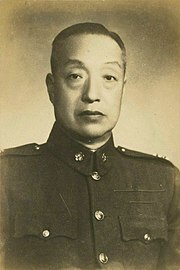Xu Yongchang
You can helpexpand this article with text translated fromthe corresponding articlein Chinese.(May 2023)Click [show] for important translation instructions.
|
Xu Yongchang | |
|---|---|
 | |
| Native name | Từ vĩnh xương |
| Born | December 15, 1885 Yuanping,Shanxi,Qing dynasty |
| Died | 12 July 1959(aged 73) Taipei,Taiwan |
| Allegiance | |
| Service/ | |
| Years of service | 1909–1959 |
| Rank | General |
| Unit | Shanxi clique |
| Commands | First War Zone |
| Battles/wars | |
| Awards | Order of Blue Sky and White Sun |
| Other work | government advisor |
GeneralXu Yongchang(15 December 1885 – 12 July 1959) (Hsu Yung-chang;Chinese:Từ vĩnh xương;pinyin:Xú Yǒngchāng;Wade–Giles:Hsu2Yung3-ch'ang1;style name: Cichen (Tzu-chen)) was the Minister of Board of Military Operations of theRepublic of Chinabetween December 22, 1948, and April 22, 1949, and the representative of theRepublic of Chinaon September 2, 1945, at the signing of theInstrument of Surrender of Japanthat endedWorld War II.
Xu Yongchang graduated from theBeijing Military Instituteand later became the General Commander of the 3rd Army underFeng Yuxiangand the 20th Route Jin Army underYan Xishan.He was the Chairman ofShanxiprovince at the time ofMukden Incident,and served in theNational Revolutionary Armyas the Chief Operations Supreme Staff.

After theSecond Sino-Japanese War,he was the president of the Beijing Military Institute and the Minister of Defence. He represented China at theJapanese Instrument of Surrender.He went toTaiwanafter theChinese Civil War,served as a senior advisor to the Office of thePresidentand a member of Central Review Committee, and died in 1959.
Xu Yongchang's diary was published by theAcademia Sinica's Institute of Modern History in 1989.
